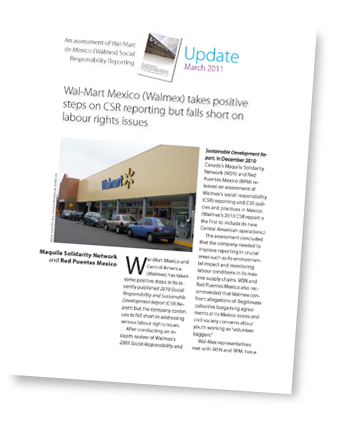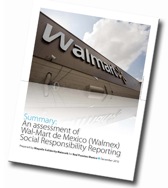WELCOME TO THE ARCHIVE (1994-2014) OF THE MAQUILA SOLIDARITY NETWORK. For current information on our ongoing work on the living wage, women's labour rights, freedom of association, corporate accountability and Bangladesh fire and safety, please visit our new website, launched in October, 2015: www.maquilasolidarity.org

Part of MSN's work to promote Freedom of Association in Mexico has focused on engaging with international apparel brands on steps they can take to ensure that their Mexican suppliers respect the right of workers to organize and bargain collectively. Our strategy has been to leverage brand influence on their suppliers to achieve a more positive climate for freedom of association in Mexican supply chains.
MSN's Freedom of Association in Mexico Tool Kit, which was updated in December 2014, sets out how brands can strengthen their FOA policies, auditing procedures and corrective action plans, as well as communication with vendors, suppliers and licensees on those policies and expectations. It also promotes greater transparency so that workers are aware of their rights and any agreements negotiated on their behalf.
Highlights of MSN's engagement work from our 2012 Annual Report.
Highlights of MSN's engagement work from our 2011 Annual Report.
 A new study co-authored by the Maquila Solidarity Network (MSN - Canada), the Honduran Independent Monitoring Team (EMIH), and Professionals for Corporate Social Auditing (PASE - Nicaragua) challenges the conventional wisdom that competing on the basis of cheap labour is the only option for poor garment producing countries.
A new study co-authored by the Maquila Solidarity Network (MSN - Canada), the Honduran Independent Monitoring Team (EMIH), and Professionals for Corporate Social Auditing (PASE - Nicaragua) challenges the conventional wisdom that competing on the basis of cheap labour is the only option for poor garment producing countries.
 Can CSR ratings help improve labour practices in global supply chains?, a new paper published by the Maquila Solidarity Network (MSN) and the Project on Organizing, Development, Education and Research (PODER), examines the potential of rating systems to drive improvements in supply chain labour practices. Through interviews with CSR experts, representatives from companies like Levi's, Gap and others that have been rated on supply chain labour issues, labour rights advocacy groups, and rating system developers, the paper highlights some key challenges facing rating systems and how some rating systems have tried to overcome, or at least minimize, those challenges.
Can CSR ratings help improve labour practices in global supply chains?, a new paper published by the Maquila Solidarity Network (MSN) and the Project on Organizing, Development, Education and Research (PODER), examines the potential of rating systems to drive improvements in supply chain labour practices. Through interviews with CSR experts, representatives from companies like Levi's, Gap and others that have been rated on supply chain labour issues, labour rights advocacy groups, and rating system developers, the paper highlights some key challenges facing rating systems and how some rating systems have tried to overcome, or at least minimize, those challenges.
 Wal-Mart Mexico and Central America (Walmex) has taken some positive steps in its recently published 2010 Social Responsibility and Sustainable Development Report (CSR Report) but the company continues to fall short in addressing serious labour rights issues. If Walmex is genuinely committed to improving its CSR programs and public reporting, the company needs to go beyond the small, though laudable, reporting advancements it has made in 2010 and tackle the difficult and pressing issues being raised by civil society stakeholders.
Wal-Mart Mexico and Central America (Walmex) has taken some positive steps in its recently published 2010 Social Responsibility and Sustainable Development Report (CSR Report) but the company continues to fall short in addressing serious labour rights issues. If Walmex is genuinely committed to improving its CSR programs and public reporting, the company needs to go beyond the small, though laudable, reporting advancements it has made in 2010 and tackle the difficult and pressing issues being raised by civil society stakeholders.
 A new report by MSN and Red Puentes Mexico examining Wal-Mart Mexico's (Walmex) CSR reporting, finds weaknesses in the company's reporting and practices, particularly in the areas of labour rights and the environment. "Walmex needs to better address underlying policy issues such as the presence of protection contracts in most of its retail outlets, its treatment of over 23,000 "volunteer" youth baggers and the lack of consultation with civil society stakeholders on social and environmental issues," says Beatriz Lujan, of the Authentic Labour Front, a member organization of Red Puentes Mexico.
A new report by MSN and Red Puentes Mexico examining Wal-Mart Mexico's (Walmex) CSR reporting, finds weaknesses in the company's reporting and practices, particularly in the areas of labour rights and the environment. "Walmex needs to better address underlying policy issues such as the presence of protection contracts in most of its retail outlets, its treatment of over 23,000 "volunteer" youth baggers and the lack of consultation with civil society stakeholders on social and environmental issues," says Beatriz Lujan, of the Authentic Labour Front, a member organization of Red Puentes Mexico.